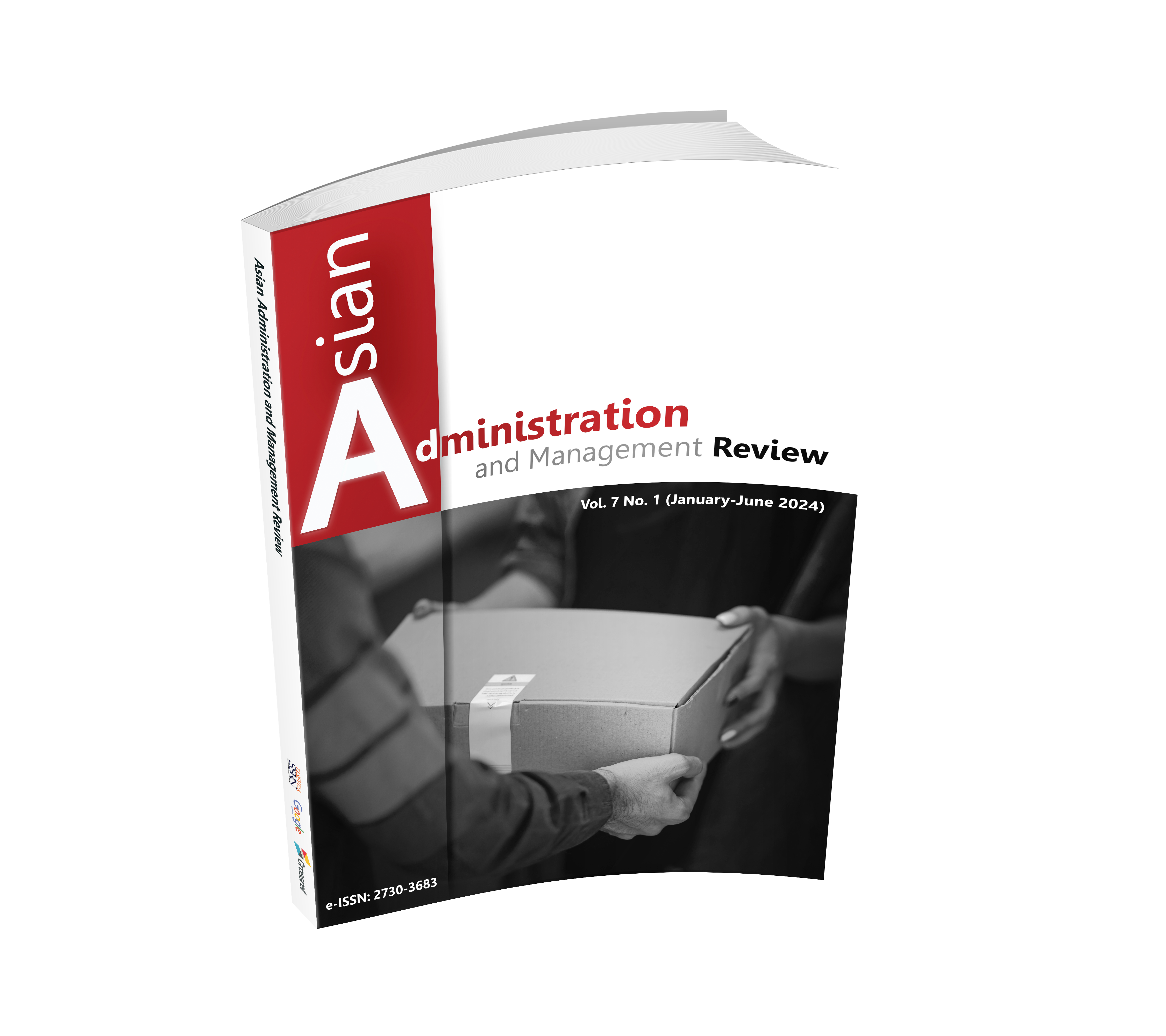FACTORS AFFECTING THE DECISION TO PURSUE THE ACCOUNTING PROFESSION OF SENIOR HIGH SCHOOL STUDENTS IN THE EASTERN ECONOMIC CORRIDOR OF THAILAND
DOI:
https://doi.org/10.14456/aamr.2024.16Keywords:
Personal Interests, Self-Efficacy, Outcome Expectations, Social Cognitive Career TheoryAbstract
The researchers aimed to investigate whether factors of personal interests, self-efficacy beliefs, and outcome expectations affect the decision of senior high school students in the Eastern Economic Corridor (EEC) of Thailand to pursue a profession in accounting. The study included a cohort of 397 people who were chosen by purposive sample approaches, specifically Chonburi Sukkhabot School, Rayongwittayakom School 1, and Benchamaratrungsarit School 2. The study found that personal interests significantly positively impacted decision-making. However, self-efficacy beliefs also substantially influenced the choice to pursue a career in accounting. The component of outcome expectations has a positive impact on the decision to pursue a career in accounting, but it is not statistically significant. This suggests uncertainty about the quality of life and a lack of expectations before entering this field. Therefore, it is crucial to cultivate a thorough comprehension of practical advantages, interpersonal advantages, and intellectual advantages.
Downloads
References
Aaker, D., Kumar, V., & Day, G. (2000). Marketing Research. 7th ed. New Jersey: John Wiley & Sons, Inc.
Ajayi, O., Moosa, M., & Aloka, P. (2023). Relationship between Career Interest and Career Decision-Making of Grade 12 Learners in Township Secondary Schools in South Africa. Athens Journal of Education, 10(2), 307-322.
Alimbudiono, R. (2020). Accounting Knowledge as a Contributing Intention on Improving Public Accounting Profession. Journal of Asian Finance, Economics and Business, 7(9), 801-809.
Apisithpinyo, B., & Burinwattana, S. (2023). Characteristics of Aspiring Accountants of Enterprise: Evidence from Nakhon Ratchasima, Thailand. Asian Administration & Management Review, 6(2), 52-62.
Aslan, Y., & Koçak, O. (2023). How do Family Influence on Career Choices and Perceived Social Support Affect Students’ Life Satisfaction in Turkey? The Role of Vocational Outcome Expectations as Mediator. International Journal for Educational and Vocational Guidance, https://doi.org/10.1007/s10775-023-09602-1.
Atangongo, B., Teye-Kwadjo, E., & Larry-Afutu, J. (2024). Factors Influencing Career Interests and Choices of High School Adolescents in Tamale, Northern Ghana. International Journal for the Advancement of Counselling, https://doi.org/10.1007/s10447-024-09549-0.
Bandura, A. (1986). Social Foundations of Thought and Action: A Social Cognitive Theory. New Jersey: Prentice-Hall.
Black, K. (2006). Business Statistics for Contemporary Decision Making. 4th ed. New York: John Wiley & Sons Inc.
Chan, C. (2020). Social Support, Career Beliefs, and Career Self-Efficacy in Determination of Taiwanese College Athletes’ Career Development. Journal of Hospitality, Leisure, Sport & Tourism Education, 26, 100232.
Cooper, D., & Schindler, P. (2006). Business Research Methods. 9th ed. New York: McGraw-Hill.
Education Development Group. (2021). Examine the determinants influencing students' career choices in the Eastern Economic Corridor (EEC). Chonburi: Regional Education Office No.8.
Enget, K., Garcia, J., & Webinger, M. (2020). Majoring in Accounting: Effects of Gender, Difficulty, Career Opportunities, and the Impostor Phenomenon on Student Choice. Journal of Accounting Education, 53, 100693.
Espinosa-Pike, M., Aldazabal, E., & Barrainkua, I. (2021). Undergraduate Business Students’ Perception of Auditing: Impact of Proximity and Knowledge on Auditors’ Stereotype. Managerial Auditing Journal, 36(5), 699-723.
Hitka, M., Štarchoň, P., Lorincová, S., & Caha, Z. (2021). Education as a Key in Career Building. Journal of Business Economics and Management, 22(4), 1065-1083.
Ilonen, S., & Hytonen, K. (2023). Why Should I Become an Intrapreneur? Introducing the Concept of Intrapreneurial Outcome Expectations. Entrepreneurship Education and Pedagogy, 6(2), 251-275.
Joshi, A., Kale, S., Chandel, S., & Pal, D. (2015). Likert Scale: Explored and Explained. British Journal of Applied Science & Technology, 7(4), 396-403.
Kautish, P., Hameed, S., Kour, P., & Walia, S. (2022). Career Beliefs, Self-efficacy and VUCA Skills: A Study among Generation Z Female Students of Tourism and Hospitality. Journal of Hospitality, Leisure, Sport & Tourism Education, 30, 100340.
Kholid, M., Tumewang, Y., & Salsabilla, S. (2020). Understanding Students’ Choice of Becoming Certified Sharia Accountant in Indonesia. The Journal of Asian Finance, Economics and Business, 7(10), 219-230.
Kummanang, R., Chaimongkol, N., Rattanajarana, S., & Wongsuttitham, S. (2017). Image of Professional Nurse as Perceived by High-School Student in the Easten Region. The Journal of Faculty of Nursing Burapha University, 25(4), 11-20.
Lent, R., Brown, S., & Hackett, G. (1994). Toward a Unifying Social Cognitive Theory of Career and Academic Interest, Choice, and Performance. Journal of Vocational Behavior, 45(1), 79-122.
Malthus, S., & Fowler, C. (2009). Perceptions of Accounting: A Qualitative New Zealand Study. Pacific Accounting Review, 21(1), 26-47.
Marley, R., Mellon, M., & MacAulay, K. (2023). Can an understanding of the accounting function assist with breaking stereotypes?. Accounting Education, 1-17.
Ng, Y., Lai, S., Su, Z., Yap, J., Teoh, H., & Lee, H. (2017). Factors Influencing Accounting Students’ Career paths. Journal of Management Development, 36(3), 319-329.
Nishiyama, Y., Camillo, A., & Jinkens, R. (2014). Gender and Motives for Accountancy. Journal of Applied Accounting Research, 15(2), 175-196.
Nunnally, J., & Bernstein, I. (1994). Psychometric theory. 3rd ed. New York: McGraw-Hill.
Oben, J., & van Rooyen, A. (2023). Social Cognitive Career Theory and Rural High School Learners’ Intentions to Pursue an Accounting Career. Accounting Education, 32(4), 445-478.
Office of the Basic Education Commission. (2022). Statistics for Education in 2022. Retrieved from www.bopp.go.th/?page_id=1828.
Okougbo, P., Okike, E., & Alao, A. (2021). Accounting Ethics Education and the Ethical Awareness of Undergraduates: an Experimental Study. Accounting Education, 30(3), 258-276.
Soontornwiwattana, C. (2023). Workforce Expectations of the New Generation: A Case Study of Thai Social Science Pre-Graduates. ASEAN Journal of Management & Innovation, 10(1), 96-107.
Srikeaw, B. (2022). Artificial Intelligence (AI) Changes and Big Data Analysis on Future of Accounting Profession. Journal of Federation of Accounting Professions, 4(11), 48-57.
Tetteh, L., Agyenim-Boateng, C., Kwarteng, A., Muda, P., & Sunu, P. (2022). Utilizing the Social Cognitive Career Theory in Understanding Students’Choice in Selecting Auditing as a Career: Evidence from Ghana. Journal of Applied Accounting Research, 23(3), 715-737.
Wood, R., & Bandura, A. (1989). Social Cognitive Theory of Organizational Management. Academy of management Review, 14(3), 361-384.

Downloads
Published
How to Cite
Issue
Section
License
Copyright (c) 2024 Authors

This work is licensed under a Creative Commons Attribution-NonCommercial-NoDerivatives 4.0 International License.











.png)


